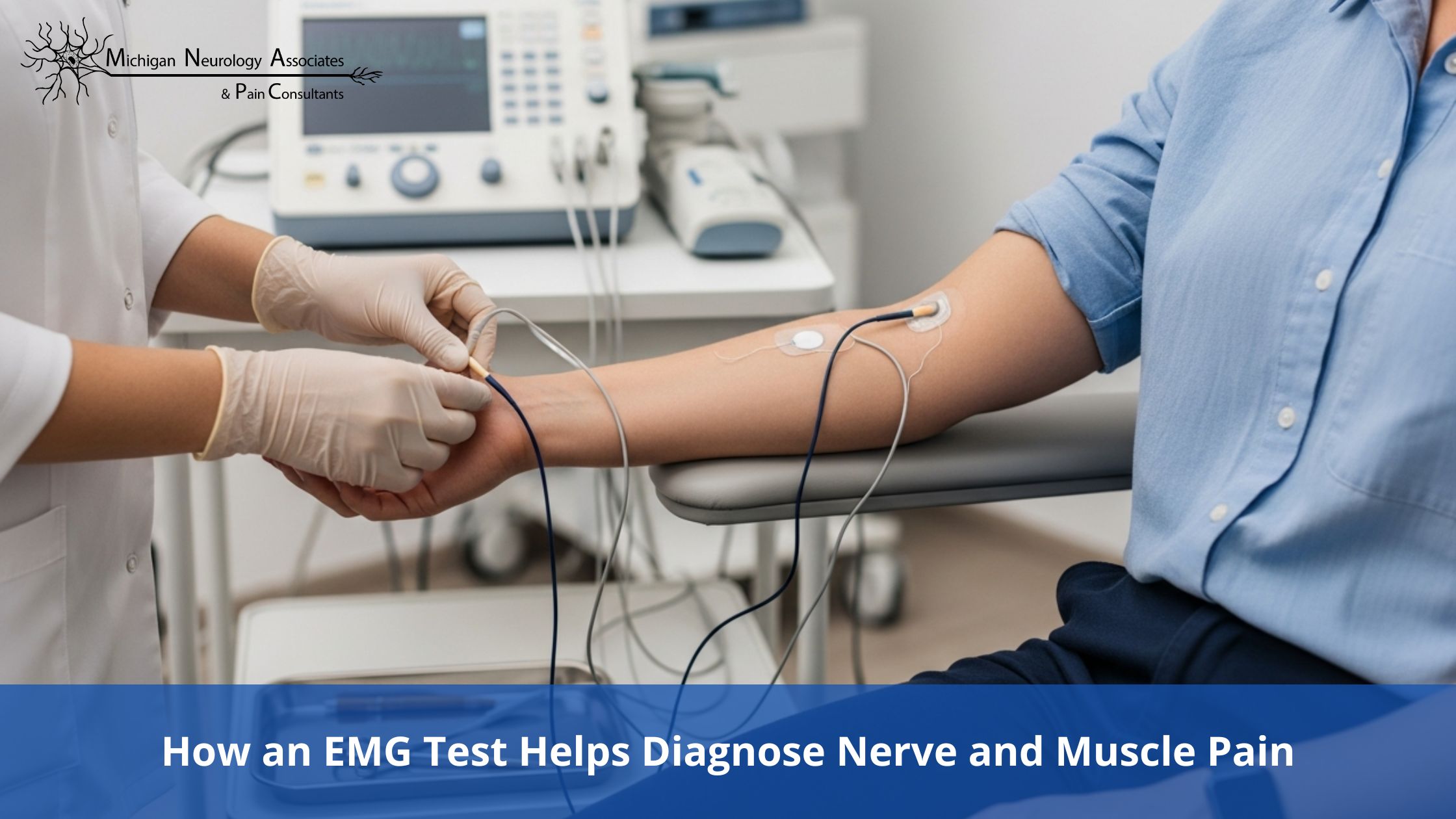



Nerve and muscle pain can feel like more than just discomfort, it can interrupt your day, affect your focus, and even make simple movements feel exhausting. Tingling, numbness, weakness, or burning sensations are often signs that the communication between your nerves and muscles isn’t working as it should.
When these symptoms persist, your neurologist may recommend an electromyography test (EMG), a precise diagnostic tool designed to uncover what’s happening beneath the surface.
Read on to learn how an EMG test reveals the source of nerve and muscle pain and supports accurate, personalized care.
An EMG test (electromyography) measures the electrical signals that travel between your nerves and muscles, the body’s communication network for movement and strength. By studying these signals, doctors can determine whether your pain, weakness, or numbness originates from a muscle condition, a nerve problem, or both.
EMG testing is a routine yet powerful part of diagnosing unexplained pain, tingling, or muscle weakness. It’s often paired with a Nerve Conduction Study (NCS), which evaluates how efficiently your nerves send signals. Together, these tests provide a clear, detailed view of your neuromuscular function, helping your care team identify issues that might otherwise go undetected.
An EMG nerve study is often recommended when symptoms suggest your nerves or muscles aren’t functioning normally. You may be referred for testing if you experience:
An EMG diagnosis helps pinpoint whether the issue lies within the muscles themselves or in the nerves controlling them. This accuracy allows neurologists to focus treatment where it matters most, targeting the source, not just the symptoms.
Knowing what to expect during an EMG can ease any uncertainty before your appointment. The procedure is safe, minimally invasive, and typically completed in 30–60 minutes.
It involves two main steps:
You may feel a mild tingling or brief muscle twitch during the test, but discomfort is usually minimal and short-lived. Most patients return to their normal routines immediately afterward, no recovery time is needed.
The value of an EMG lies in the precision of the information it provides. The results help neurologists see how your muscles and nerves respond and interact, offering insight that visual imaging alone can’t provide.
Your EMG may reveal:
With this knowledge, your neurologist can recommend treatments tailored specifically to your diagnosis, such as physical therapy, medications, injections, or additional testing.
Preparation is simple and helps ensure accurate results:
At Michigan Neurology Associates, our team explains every step clearly, helping you feel informed and comfortable before, during, and after the procedure.
Once your test is complete, you can immediately resume your normal routine. Some mild tenderness or bruising at the test site may occur, but it typically resolves quickly.
Your neurologist will review and interpret the results, often the same or the next day. During your follow-up visit, you’ll discuss the findings and how they relate to your symptoms, along with a personalized plan for managing pain and improving function.
An electromyography test turns uncertainty into clarity, helping your care team identify the exact problem and build a pathway toward long-term relief.
When diagnosing nerve and muscle pain, precision and expertise are essential. At Michigan Neurology Associates & Pain Consultants, we combine advanced technology with extensive clinical experience to deliver accurate results and compassionate care.
Our centers provide:
Here, patients receive more than a diagnosis, they gain clarity, confidence, and a clear direction toward recovery.
An EMG test sheds light on what your body has been trying to tell you. It turns vague symptoms into clear answers, helping you and your doctor understand the “why” behind your pain or weakness. With that clarity, treatment stops being guesswork, it becomes a focused step toward feeling stronger, more in control, and ready to get back to what you enjoy.
Pain shouldn’t be a mystery you learn to live with. At Michigan Neurology Associates & Pain Consultants, EMG testing helps uncover what your body is really trying to say. With precise answers and compassionate care, we help you move from uncertainty to control, because understanding your pain is the first step to easing it. Book your EMG test today and take the next step toward relief and reassurance.